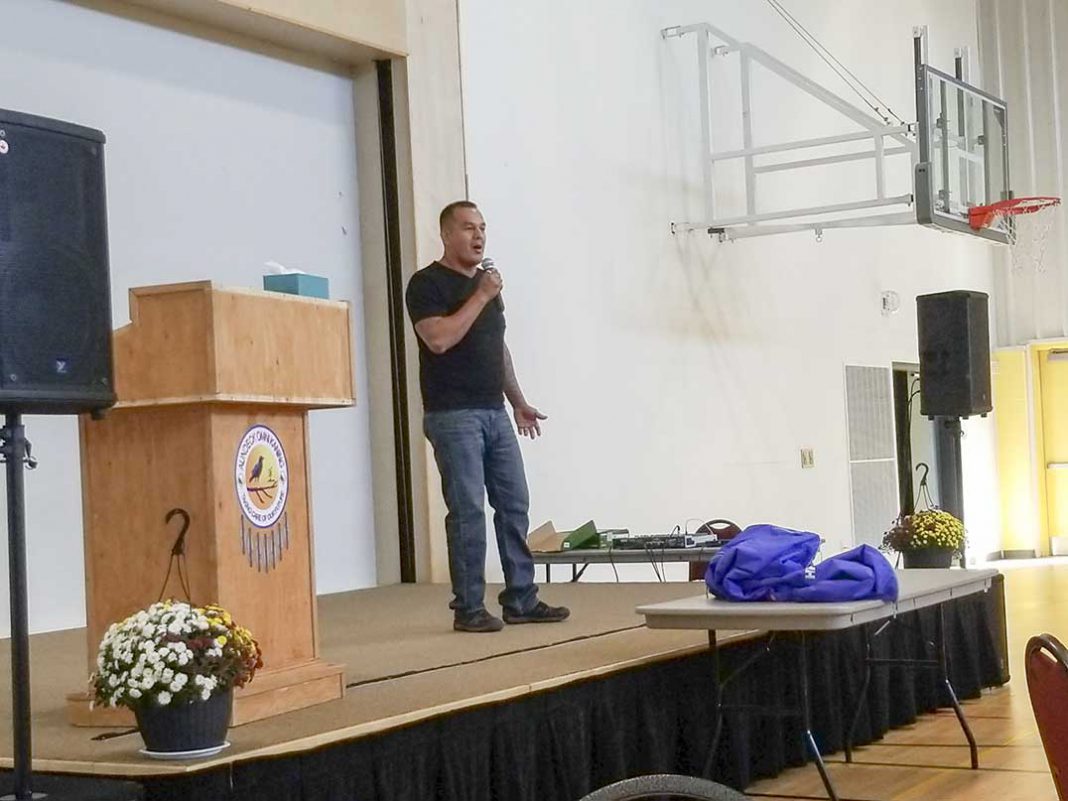AUNDECK OMNI KANING—Sometimes in our lives darkness seems to close in and hope takes flight into the gathering gloom, but each year the annual Recovery Breakfast and its speakers shine a beacon of hope to light the way to a fruitful life.
The Shkimaadizwin Recovery Breakfast celebrated its ninth year this past Thursday, September 27 starting at 9:30 am at the Four Directions Complex in Aundeck Omni Kaning with a meet and greet, with breakfast following at 10 am. Emcee Al Boyd, who has participated in every one of the previous eight events kept things moving smoothly through the morning.
Anishinabe-kwe singer Danielle McDonald-Roy sang a welcome song to get everything underway followed by a prayer and invocation by AOK elder Georgina Nahwegabow.
The two speakers for this year’s event were Jonathan Peltier, a Wiikwemkoong band member, and Connie Harper of Little Current. Both speakers have consented to their stories being relayed in the hopes that their struggles will in some way help or inspire others to find their own path to sobriety.
Mr. Peltier is in his second year of an addiction prevention worker course in college. “Eagle Spirit, deer clan, Wiikwemkoong is my home,” opened Mr. Peltier. “My recovery started long before I stopped using.”
Mr. Peltier described his life in drug addiction, a life that saw him dealing drugs. “I was part of the problem,” a life that saw him wind up in prison and eventually to lying in a hospital bed, unable to walk due to a disease that was a consequence of his using. It was a life that seemed to be approaching an end, a life where he was abandoned by his family, friends and fellow travellers, a life where he was almost utterly alone.
“The only person who came to see me in the hospital was my mom, my mom never gave up on me—that unconditional love,” he recalled. But his two sons no longer wanted to have anything to do with their father.
“If you had told me this was where I would wind up, I probably would never have started,” he said. “Drug addiction is a cruel game.”
“I thought I was a pretty solid guy,” he recalled. “I had a bit of power over people, but really, I was part of the problem and I wanted to be part of the solution.”
His story of self loathing and compensation would be familiar to many. Wanting to take a different path but always being drawn back into the dark world. In order to get on that path, he had to let go of that whole life.
“There is this ‘bro-hood’,” he said. “When you are in that game, there are lots of things people throw around. Like ‘word,’ which is supposed to mean honest. But really, there is no honesty, loyalty, it is all about loyalty to themselves. There is no humility. Humility is thinking of someone other than yourself.”
Mr. Peltier spoke of the concept of an 11th hour redemption, which he characterized as a shame. “It can’t be in your 11th hour,” he said of the decision to follow the path of sobriety. “My mom always used to say, ‘you can’t always call when it is over’,” said Mr. Peltier. He noted that many people take on recovery programs when they are facing jail time, hoping for a more lenient sentence. But the real sentence comes by trying to fool others, and even yourself.
When he really began to try to step away from his addiction, when it wasn’t in his 11th hour, Mr. Peltier found that there were people who were willing to help. “They saw that I was really trying,” he said. Mr. Peltier gave a shout out to the folks at Rainbow Lodge, a treatment centre based in his home community. “They inspired me,” he said. “They are not there for themselves, they are there for other people.”
He advised people who truly want to find sobriety to reach out.
“Nobody is going to come to your door and say ‘I know you need help’,” said Mr. Peltier. “Sobriety isn’t rewarding, nobody is going to pat you on the back,” he cautioned. But he said that finding hope in the future makes the journey worthwhile.
“You can’t change the past,” he said. “It happened, you can’t change that.” But if it is something you want to do, if you have issues standing in your way, “you need to deal with them,” he said. “I have been there,” continued Mr. Peltier. “I changed how I see things.”
Mr. Peltier said that his goal in life now is to help other people. “It has to be for other people.”
“If you think that recovery is unattainable, it is. It is there. You can do it.”
Ms. Harper then took to the microphone, but eschewed standing on the stage.
“I have been sober since 7:20 this morning,” she said. “I go day-by-day.”
Ms. Harper had a great life. She started drinking socially at age 17, but she worked hard in school, got good marks, and ended up in nursing school.
“You don’t have a lot of time when you are studying nursing,” she recalled.
She got married, had a child, divorced and married again. With the second husband, “we drank quite a lot,” said Ms. Harper. My drinking escalated.” Eventually that relationship tanked as well.
But her drinking still wasn’t a problem, she believed. “I was able to stop,” she said. “I still had a job, I met another man who was 15 years sober. He was in AA (Alcoholics Anonymous), but I drank at his house. He didn’t seem to mind.”
By this time her drinking habit was serious. “If your liquor store manager is hugging you when you walk in the door, you really need to look at your habit,” she said, recalling an incident from that time. She was by then drinking in the morning to start her day. She knew she needed help.
“I went to detox that morning,” she said. She detoxed, went sober for five months, attending meetings five times a week. “I stayed sober,” she recalled. Then things started to slip. “I started going to only one meeting a week,” said Ms. Harper. “One day I thought to myself ‘I can have a small bottle of wine.’ Within four weeks I was drinking four bottles a day again. I lost my ability to work. I lost that relationship—he threw me out in the middle of the night.” She was only drinking by then, not eating and wasting away to skin and bone. “It was terrible,” she recalled. “I was shaking so bad I could not hold a cup of coffee.”
She recalled an incident when she took her four-year-old grandson grocery shopping. “Pure vanilla has alcohol in it,” she said. She got two bottles of vanilla and downed them and by the time they got home she was drunk.
What followed was a series of recoveries and relapses. “I was in and out of AA. I went to AA drunk. I sat there in those meetings with those men, those wonderful men, and they put their arms around me and took me home,” she said. One day she was hospitalized and her grandchild asked why. “They told him it was my gall bladder,” she said. “I was ready to kill myself.” Two paramedics and two police officers came to the door and took her to hospital.
She no longer could recognize the person she saw in the mirror. She wound up in Kirkwood, the mental health institution in Sudbury. “It was there that I began to think of myself as a non-drinking person,” she said. She kept seeing her psychiatrist, but she used to drink in their office. “I put vanilla in my coffee.”
But at some point she made the decision to stop disrespecting and hurting the people she loved.
“Somehow I decided I wasn’t going to drink,” she said. That day was two years and four months ago. She has slowly rebuilt her life. She has a job with responsibility now. “It means a lot to me that I have earned that trust back,” she said.
“Nobody gave up on me,” she said. “I decided that I have to pass this on. That is my story. It is not easy standing up here in front of you and I want to say that I hope to be sober for the rest of the day.” Following the breakfast, Ms. Harper said that she hoped that by sharing her story she could inspire others, “even if it is just one person,” to find their own way to recovery.
In an unscheduled part of the program, a young man from Sheguiandah named Cody Towers told his own story of addiction, sharing a poem that he wrote, ‘Words of Healing,’ that he hoped would help inspire others.
Recovery Breakfast organizer Rob Wabegijig thanked everyone for coming out to the event. “It is good to see a really big crowd,” he said.
Mr. Wabegijig reminded those attending that there will be a two-day National Addictions Awareness Week conference at the M’Chigeeng First Nation community complex, November 28 and 29 starting each day at 8 am to 4 pm on Wednesday and 5 pm on Thursday. For further information, contact Rachel Maracle or Floyd Ense at 705-377-5347.





